"Be not forgetful to entertain Strangers, for thereby some have entertained Angels unawares" "To the Glory of God in His mercy Grant us Grace" | 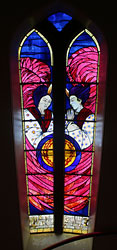 |
Comforting Angels, detail. | 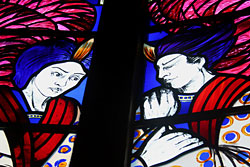 |
Angel's head, detail. |  |
Text and lower wings, detail. | 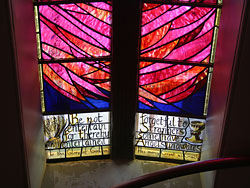 |
Text and Cup of Sorrows, detail. | 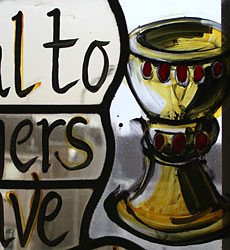 |
Lower wings and blue sky, detail. | 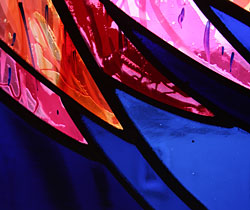 |
Wings, detail. | 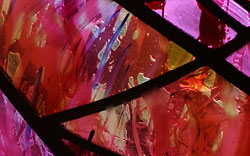 |
Every aspect of this window was done together by Rab and Linda. Rab's initial "cartoon" was passed by three Committees before he painted a full size working painting of The Angels. |  |
Tracing paper was laid on top of the large painting, and a "lead-line" drawing was marked out on top of it, indicating where the glass would be cut and each panel separated. | 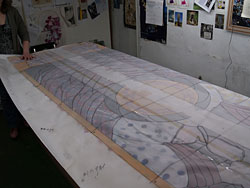 |
Fourteen small "palettes" of glass were cut and painted with cold, black, acrylic paint, to give each piece of glass a "home" during the complex manufacturing process. | 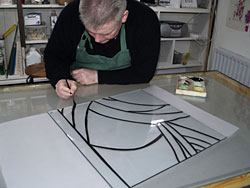 |
Each piece of hand made glass was cut by hand. The pink wings and the tunics were both made of two separate layers of glass, so each shape had to be accurately cut twice. | 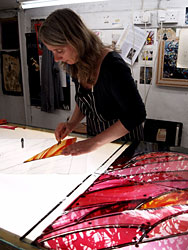 |
English Antique Glass was used throughout the window, as well as flashed glass from St Just and Lamberts. | 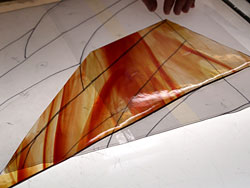 |
Black printmakers' bitumen was painted (like a Jackson Pollock "drip" painting) all over the lower layer of the pink wings. | 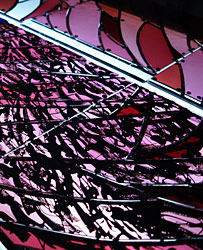 |
Each piece of bitumen-covered glass was then soaked in Hyrdofluoric Acid and carefully worked until layers of colour were removed. The bitumen was then removed in baths of white spirit. | 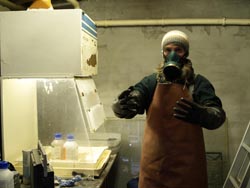 |
The result was a complex textured pink painting throughout the wings. The Angel's clothes were made in the same way. | 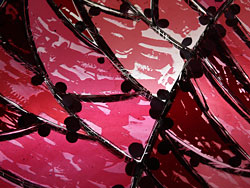 |
A second layer of pink was cut, and painted with debitus blue and white enamels. Each piece was carefully placed in a bed of whiting, and fired in a slow, annealing kiln. 24 square feet of glass - only one heat crack! | 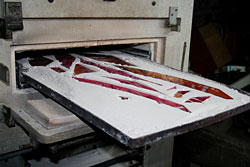 |
The result of the top painted pink glass, and the lower etched pink glass was a mass of heavily textured, rich, vibrant pink wings. | 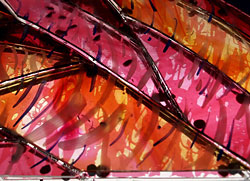 |
The two layers were joined together using copper foil. Each section was fitted exactly using the lead-line cartoon drawing. | 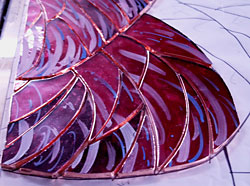 |
After the cutting, etching, painting and plating, the whole window was checked for anything we'd missed, before leading up. | 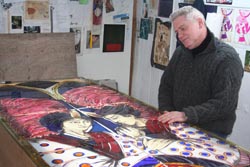 |
Angus the cat assisted us in leading up each panel. The lead was extra wide heart to accomodate the double layered glass. | 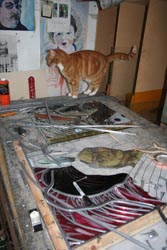 |
After leading and soldering, each panel was puttied by hand, and left to harden for at least two weeks. | 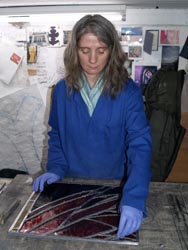 |
We carefully removed the existing quarry window, taking care not to damage the stonework on either side, particularly the central column. The old quarries were salvaged for use, if required, throughout the church. | 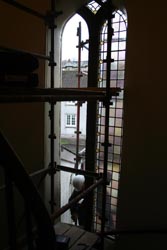 |
The installation took a week. We used phosphor brass "T" bars which had to be individually cut and carved into the stonework. Traditional lime mortar was used to bed the window. The whole window has been protected with vented, secondary glazing. Thanks to Tony McShand, scaffolders and The Glazing Co., both of Greenock, for the scaffold and external glazing. | 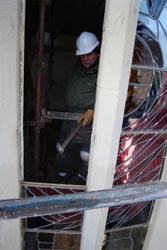 |